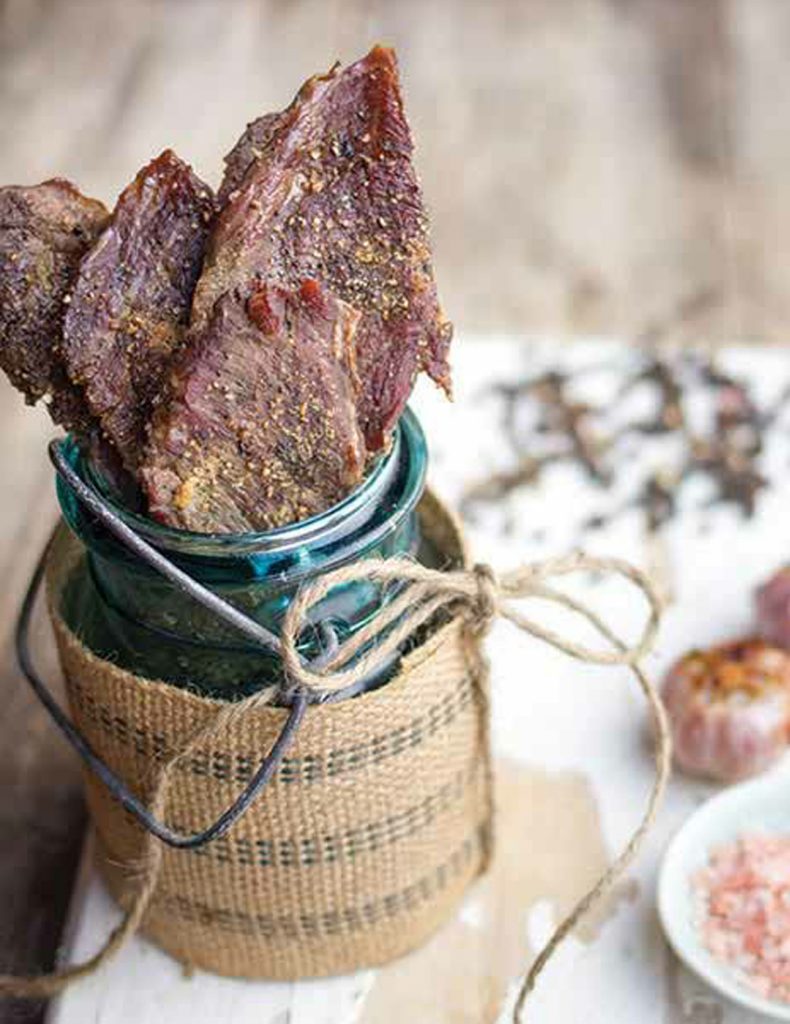 Jerky tastes great and is the ultimate portable food. We often pack it on camping trips. But it is hard to find store-bought jerky that doesn’t contain gluten or soy. Thankfully, making homemade jerky is extremely easy; it just takes time to dehydrate. My tip for you is to make a double batch and store it in the freezer.
Jerky tastes great and is the ultimate portable food. We often pack it on camping trips. But it is hard to find store-bought jerky that doesn’t contain gluten or soy. Thankfully, making homemade jerky is extremely easy; it just takes time to dehydrate. My tip for you is to make a double batch and store it in the freezer.
Marinade
- ½ cup coconut aminos or wheat-free tamari
- 3 tablespoons MCT oil or macadamia nut oil
- 2 teaspoons Swerve confectioners’-style sweetener or equivalent amount of liquid or powdered sweetener
- 2 teaspoons lime juice
- 1 tablespoon grated fresh ginger
- 1 teaspoon finely chopped garlic, or cloves from ½ head roasted garlic
- 1 teaspoon fine sea salt
How to Make It
- Place the meat in the freezer for 1 hour to make it easier to slice cleanly. Slice the meat across the grain into long strips, 1 inch wide and ⅛ inch thick.
- Combine the marinade ingredients in a large shallow bowl. Submerge the strips of meat in the marinade, cover, and marinate in the fridge for at least 2 hours or overnight. Remove the meat from the marinade and sprinkle with the salt. Dehydrator method
- Place the strips of meat in a dehydrator, not touching each other, and set the dehydrator to low (170°F). Oven method
- If you do not have a dehydrator, preheat the oven to 160°F. Place a rimmed baking sheet on the bottom of the oven (or bottom rack) to catch drips. Arrange the strips of marinated meat directly on the middle rack, not touching each other. Alternatively, place a wire rack on a rimmed baking sheet and arrange the strips of meat on the wire rack. For both methods
- Dehydrate the meat for 6 to 8 hours, until the jerky dries to the desired chewiness. For a chewier jerky, dehydrate for less time.
- Store in an airtight container in the refrigerator for up to 2 weeks or in the freezer for up to a month.
| Nutrition Facts |
Serving Size 1 |
Nutritional Value Per Serving | Calories 84 kcal Calories from Fat: 36 kcal |
|
% Daily Value*
|
| Total Fat 4 g 11% |
Trans Fat 0.0 g |
Protein 16.6 g 33% |
* Above mentioned %DVs (Percent Daily Values) are based on 2,000 calorie food intake.
DVs (Daily values) may be vary depending upon individuals daily calorie needs. Above nutritional values are estimates and should only be used as a guide for approximation. They are not allfoodchef.com recommendations. Calculations are based on average weight of 194 lbs. and ages of 19 to 50 years. |
